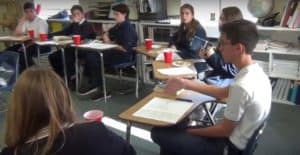Jennifer Th omas has taught history and literature to high school and junior high students in Catholic schools for twenty-five years. During that time, including a three-year stint at an inner city diocesan school in the Oakland diocese, she has “never seen a student of good will fail to respond with an awakening enthusiasm for great literature.” She has spent the last 14 years at St. Augustine Academy in Ventura, California.
omas has taught history and literature to high school and junior high students in Catholic schools for twenty-five years. During that time, including a three-year stint at an inner city diocesan school in the Oakland diocese, she has “never seen a student of good will fail to respond with an awakening enthusiasm for great literature.” She has spent the last 14 years at St. Augustine Academy in Ventura, California.
Awakening excitement about great literature and great language is Mrs. Thomas’s number one goal as a teacher of literature. How does she approach this task? First of all, she says, the teacher needs to know and love the works she presents to her students. Intimate knowledge and personal excitement will shine out before the students and begin to get them interested. [restrict]Knowing the great works means learning more about them on your own. For example, she recommends that teachers see as many performances of Shakespeare as possible, since Shakespeare is meant to be performed, no t simply read. She warns against being too solemn in presenting Shakespeare, Homer or Virgil. “It’s a falsehood that these works are rarefied, only meaningful to the stuffy elite.” She frequently injects humor into her presentations: “Humor always helps.”
t simply read. She warns against being too solemn in presenting Shakespeare, Homer or Virgil. “It’s a falsehood that these works are rarefied, only meaningful to the stuffy elite.” She frequently injects humor into her presentations: “Humor always helps.”
Mrs. Thomas helps her students to understand and appreciate the mastery of the great writers. For example, they spend time analyzing some of Shakespeare’s sonnets, studying his meter, rhyme scheme, use of metaphors and clever closing twists. They then write their own sonnets, going through several drafts and ending with products which are often delightful. This gives students a sense of how difficult the sonnet form is. They then are amazed to see that a play like Romeo and Juliet contains several portions of dialogue that are written in sonnet form.
Annotating works is an important exercise for her students. “They hate to do it, but it introduces them to a skill that all scholars employ. Writing notes in margins is an ancient, venerable, and effective practice which will prepare them to be active readers at the college level. If nothing else, it helps them to find important texts again later.” Students are required to write up to three reasonable questions or comments per page. “I don’t want them to ask simply factual questions, like who was Hrothgar, but questions about the meaning of phrases, or how a new episode fits with what has been revealed about a character.”
 These exercises culminate in seminar discussions. Each student writes a list of three “seminar-worthy” questions about a work, ones that are open-ended and conducive to discussion. They have to have quote texts that provide a basis for the question and suggest some direction for discussion. The class will then decide together what are the most interesting questions. Each student then prepares for the seminar two to three pages of notes on the questions, providing texts pertinent to their opinion. Three or four days are then devoted to the discussion, with students bringing in special goodies to share during the periods. Besides grading the annotations, questions, and preparatory notes, Mrs. Thomas offers three points for contributions with textual support, two for those without textual support, and one point for simply saying something. “I don’t like grading the seminars, but some of the more shy students need that as a carrot.”
These exercises culminate in seminar discussions. Each student writes a list of three “seminar-worthy” questions about a work, ones that are open-ended and conducive to discussion. They have to have quote texts that provide a basis for the question and suggest some direction for discussion. The class will then decide together what are the most interesting questions. Each student then prepares for the seminar two to three pages of notes on the questions, providing texts pertinent to their opinion. Three or four days are then devoted to the discussion, with students bringing in special goodies to share during the periods. Besides grading the annotations, questions, and preparatory notes, Mrs. Thomas offers three points for contributions with textual support, two for those without textual support, and one point for simply saying something. “I don’t like grading the seminars, but some of the more shy students need that as a carrot.”
Mrs. Thomas believes that appreciation and close analysis of great authors, along with remedial composition work when necessary, improve the writing of her students. “We read Aristotle’s criteria for tragedy, then apply them to Sophocles’ plays, Oedipus Rex and Antigone, trying to discover why Aristotle thought Oedipus the greatest tragedy. These sorts of exercises really sharpen their minds by making them pay careful attention to the greats. Graduates report that they excel in composition at the college level.”
Some people might think her approach to literature and writing elitist. She completely disagrees. “What is truly elitist is thinking that lower class kids can’t respond to someone like Shakespeare. When I was working with inner city kids, who would threaten one another with nail-studded boards in class, I taught them Hamlet. We began with the more approachable style of C.S. Lewis, and worked our way up to Shakespeare. These eighth-graders ate it up. They wanted to understand it, and loved their knowledge of it. At the end, I took them to a professional performance of Hamlet. They arrived early, together with some high school kids from wealthier areas. The two groups began bantering about the play, quoting back and forth from Hamlet, and arguing about what it meant. They held their own, but more importantly, they were shining with intellectual excitement!” Awakening that excitement is what drives Jennifer Thomas as a teacher.
[/restrict]
